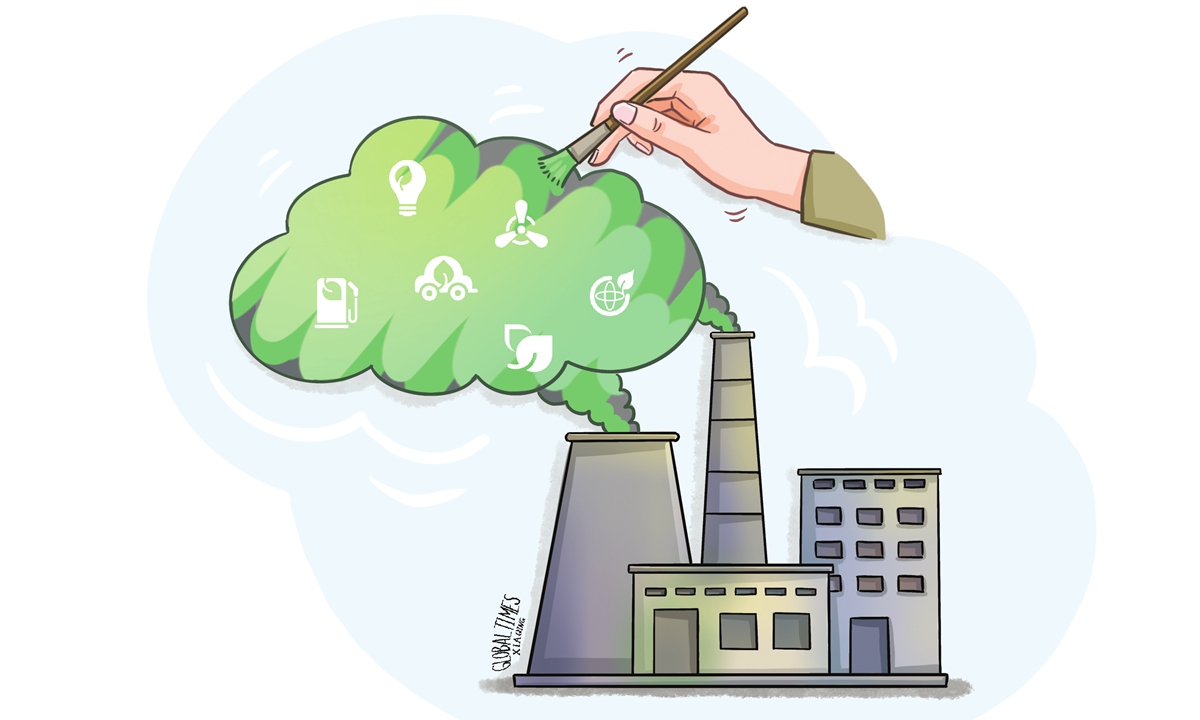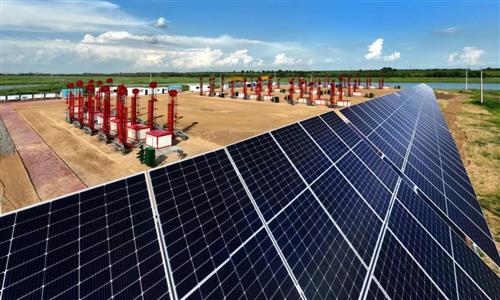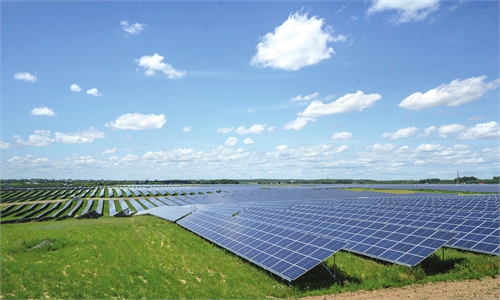The West should acknowledge China’s carbon emissions accomplishments, and learn from it

Illustration: Xia Qing/GT
According to the International Energy Agency's (IEA) World Energy Outlook 2023, which just came out recently, China's fossil fuel use will begin a long-term decline starting from 2024 - even under its most conservative scenario. If this ends up coming true, then Beijing's carbon emissions are likely to peak this year, which could mean the country will have hit its carbon emissions cap goal seven years ahead of schedule.While the EU is arguably the first major place on the planet to have reduced its emissions since the 1990s, decreasing by approximately 24 percent over this period, according to World Bank figures, much of this was on the back of offshoring to China. For its part, China saw emissions increase by 300 percent during the same period while it began a massive campaign of industrialization and economic development. Now it seems this trend is on a decline.
China is managing to reduce its carbon emissions while its energy use is continually rising each year. But that growth in usage is being met with new clean energy capacities - wind, solar and hydroelectric, among others. The Guardian revealed the country is on course to meet its wind and solar targets by 2025, five years ahead of time. Forbes also highlighted that in 2021, China surpassed the combined offshore wind installations of all countries over the past five years.
During its 14th Five-Year Plan spanning from 2021 to 2025, Beijing is poised to integrate at least 570 gigawatts (GW) of wind and solar power. This will significantly shift the country's energy mix, with non-fossil fuel sources expected to comprise more than 80 percent of its energy portfolio by 2060.
Given China's constant ahead-of-schedule accomplishments, it will almost certainly become carbon neutral before its 2060 target - but this remains to be seen for now. In addition to what China is doing domestically, however, it's also important to highlight that it's playing a pivotal role in global economic diversification. The country currently provides over 80 percent of the world's photovoltaic panels, as reported by the International Energy Agency.
Against the backdrop of these impressive accomplishments, the world's largest economy, the US, has paradoxically tried to hamper China's green energy development while others have leaned into collaborating with China. For example, the US imposed sanctions on polysilicon from Xinjiang Uygur Autonomous Region citing human rights-related concerns, which have not been substantiated. In lieu of this, it appears that the only one that has suffered is the US itself.
In January of this year, citing the China Silicon Industry Association, the South China Morning Post reported that major Chinese solar panel makers Longi Green, TCL Zhonghuan and Tongwei sliced their prices by as much as 27 percent on the back of cuts in raw material costs. It was anticipated that this would benefit the planet, particularly Europe, as the bloc moves to diversify its energy portfolio amid the ongoing conflict in Ukraine and resulting disruptions of energy supplies from Russia.
The 27-member European Union has a 2050 goal to diversify away from fossil fuels and reach carbon neutrality, with the Ukraine conflict speeding up this transition. In 2022, the EU added a staggering 41.4 GW of solar power, a 47 percent increase from the previous year. They're projected to have added another 53.6 GW this year, raising total capacity to 262 GW. Reduced prices from China will have yielded significant savings in 2023, as the EU imports roughly 50 percent of its panels from China.
But the US has not seen similar benefits. Instead, by this summer, even the New York Times acknowledged that the US was suffering mightily by not collaborating with China on green energy and essentially putting trade barriers on itself. Around that time, US climate czar John Kerry commended China for its renewable energy efforts prior to an official visit to Beijing; however, the US failed to convey a unified message about collaborating with China and did not lift the sanctions.
The IEA throwing its weight behind the fact that China is a green energy maverick is significant. It also reinforces the fact that the US' dealings with Beijing over climate - such as finger-wagging over China being the current leader of annual carbon emissions, despite also being the global industrial base and nowhere near close to the leader of historical emissions - are entirely inappropriate. The world needs more collaboration, not less, and the only way for humanity to reach the emissions benchmarks needed to avoid a collapse of the global ecosystem is to work together. The West should acknowledge China's accomplishments and work earnestly with Beijing for the common good.
The author is a Prague-based American journalist, columnist and political commentator. opinion@globaltimes.com.cn




